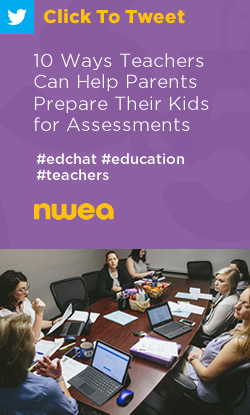 The hustle and bustle of students returning to the classroom signals the start of winter testing. As this cycle of assessment begins, it’s important to consider a vital stakeholder in student success who is sometimes left out of the discussion: our students’ parents and families. While teachers are certainly on the front lines of education, parents also play a crucial role in student success, and making the most of assessment data can help with this endeavor.
The hustle and bustle of students returning to the classroom signals the start of winter testing. As this cycle of assessment begins, it’s important to consider a vital stakeholder in student success who is sometimes left out of the discussion: our students’ parents and families. While teachers are certainly on the front lines of education, parents also play a crucial role in student success, and making the most of assessment data can help with this endeavor.
In a previous blog, we shared seven things that teachers can communicate to students before testing. To summarize, they were:
- Explain where the test fits in the bigger picture
- Share how the test results will affect their overall class grade
- Pre-empt questions about what their data will look like and who will be seeing it (including parents)
- Take the fear out of the testing jargon
- Clarify the testing environment
- Make any transition to computer or tablets easy
- Provide the dates of the next assessment
Just as we coach our students, there are points teachers can raise and tips they can impart to parents to help them not only understand assessments and results, but also in preparing their children for testing.
- Have them meet with you as often as needed to discuss their child’s progress. Suggest activities for them and their child to do at home to help prepare for tests and improve their child’s understanding of schoolwork. Parents and teachers working together benefits students.
- Make sure they have a quiet, comfortable place for their child to study at home.
- Make sure that their child is well rested on school days and especially the day of a test. Children who are tired are less able to pay attention in class or to handle the demands of a test.
- Make sure they give their child foods that fuel that their body and mind.
- Help them understand the importance of providing books and magazines for their child to read at home. By reading new materials, a child learns new words that might appear on a test. Suggest outside reading lists or provide suggestions from the public library.
 When it comes to the assessment itself, teachers need to be sure to help parents better understand the process.
When it comes to the assessment itself, teachers need to be sure to help parents better understand the process.
- Help them understand the purpose of the assessment – the difference between those used to inform instruction and those needed to meet state requirements.
- Share with them the tests that are being used in their child’s classroom and how the results of each are used.
- Share their child’s learning progress using assessment results as well as classroom observation.
- Point out academic strengths and weaknesses and how they can help address areas of concern outside of the classroom.
- Provide guidance on the importance of classroom assessments and the need for students to do their best on all tests.
One of the best, and perhaps most important, tools educators have when it comes to assessment is their voice – communicating assessment results with parents. Use and share these tips with your colleagues to help parents become assessment literate, and they will help you get the most from your students as they take assessments throughout the school year.